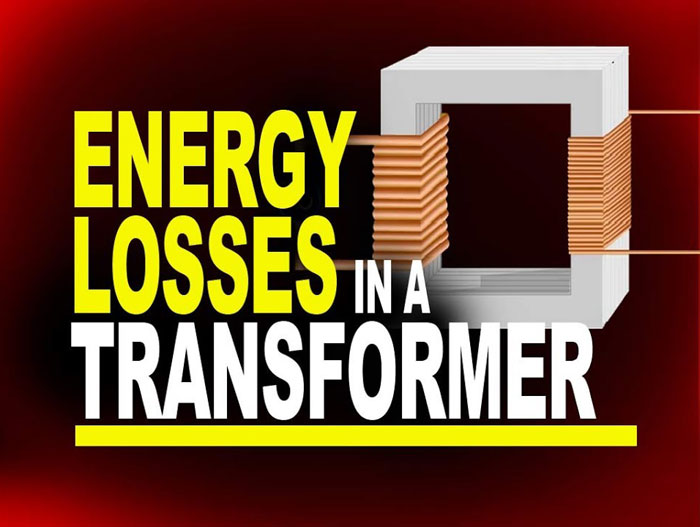There are various types of losses in the transformer such as iron loss, copper loss, stray loss, and dielectric loss.
-
Iron loss
Iron losses are caused by the alternating flux in the core of the transformer as this loss occurs in the core and it is also known as Core loss.
Iron loss is further divided into losses
- Eddy current loss
- Hysteresis loss.
-
Eddy current loss
The eddy current loss occurs because of the relative motion between the core and the magnetic flux. The eddy current loss is minimized by using the thin core of lamination.
-
Eddy current loss is given as
Pe = KeBmax2f2t2V watts
Where Ke = constant
Bmax = maximum flux density in Tesla
f = frequency of magnetic reversal in Hz
t = thickness of laminations in mm
V = volume of core in m3
-
Hysteresis loss
Hysteresis loss in a transformer occurs due to the magnetizing saturation in the core of the transformer. Hysteresis loss is given by as,
Pb = η * Bmaxn * f * V
Pb = hysteresis loss (W)
η = Steinmetz hysteresis coefficient, depending on the material (J/m3)
Bmax = maximum flux density (Wb/m2)
n = Steinmetz exponent, ranges from 1.5 to 2.5, depending on material
f = frequency of magnetic reversals per second (Hz)
V = volume of magnetic material (m3)
The hysteresis loss is minimized by using silicon steel material.
-
Copper loss
Copper loss in a transformer is generally defined as the losses that occur at the transformer winding. Transformer windings are generally made up of copper material. When current is passed through the winding due to some resistance of winding, some losses occur which is the copper loss of the transformer. The copper loss does not mean losses of copper but it is the loss due to internal winding resistance.
The copper losses are calculated from
Pc = I2 x R Watts
-
Stray losses
The stray losses occur due to the presence of leakage field including eddy current in tank wall and conductor. The winding of the transformer should be designed in such a way as to minimize the stray loss that is achieved by splitting the conductor into small strips.
-
Dielectric losses
Dielectric loss occurs in the insulating material of the transformer that is in the oil of the transformer, or the solid insulations. When the oil gets deteriorated or the solid insulation gets damaged or its quality decrease, the efficiency of a transformer is affected. The percentage of these losses is very small as compared to the iron or copper losses so it can be neglected.
